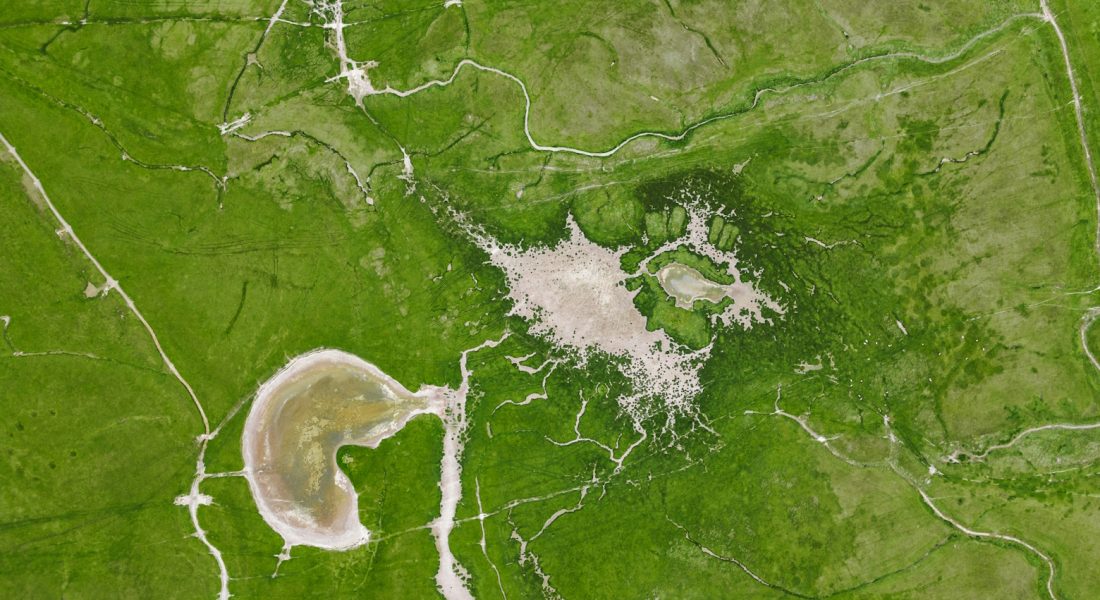Geospatial data as a service (DaaS) is revolutionizing how companies harness location-based information to drive smarter decisions. Leading providers in this space deliver real-time, actionable spatial insights to industries like urban planning, logistics, agriculture, and environmental management, eliminating the need for businesses to manage complex datasets themselves. By offering subscription-based access to advanced geospatial analytics-such as tracking land use trends, optimizing supply chains, or monitoring infrastructure-these companies make high-quality spatial data accessible without requiring specialized software or expertise. This streamlined approach empowers organizations to focus on strategic decision-making rather than wrestling with data. With innovative providers leading the charge, geospatial DaaS is shaping the future of how businesses leverage location intelligence to stay competitive and agile in a data-driven world.

1. FlyPix AI
We provide a platform for analyzing geospatial imagery, using AI to detect and monitor objects in satellite, aerial, and drone images. Our tools allow users to identify specific items in complex scenes, supporting industries like agriculture, construction, and government. The platform is designed to be user-friendly, letting people train custom AI models without needing deep programming skills, which makes it easier to adapt to specific project needs.
Our services focus on automating tasks like object detection and data analysis, with features like interactive maps and analytics dashboards. We aim to make geospatial data accessible by offering cloud-based solutions that integrate with existing workflows. By supporting multispectral data and collaborative features, we help users turn imagery into practical insights. This approach keeps things straightforward for those working with location-based data.
Key Highlights:
- Uses AI for object detection in geospatial imagery
- Supports industries like agriculture and infrastructure
- Allows custom AI model training without coding
- Offers cloud-based access and collaboration tools
Services:
- Object detection and analysis in imagery
- Custom AI model training
- Interactive map and dashboard creation
- Multispectral data processing
Contact Information:
- Website: flypix.ai
- Email: info@flypix.ai
- Phone: +49 6151 2776497
- Address: Robert-Bosch-Str. 7, 64293 Darmstadt, Germany
- LinkedIn: www.linkedin.com/company/flypix-ai

2. Korem
Korem provides a range of geospatial solutions, integrating data and software from multiple providers to support industries like insurance, retail, and telecommunications. The company focuses on combining expert advice with technology to help clients make sense of location-based data. Korem’s approach centers on simplifying the adoption of geospatial tools, offering a one-stop shop that includes data from sources like Precisely and HERE Technologies. This allows clients to access tailored analytics for better decision-making.
The company’s multidisciplinary group works closely with clients to align solutions with specific business needs. Korem prioritizes collaboration and innovation, aiming to create practical outcomes for complex geospatial challenges. With a focus on community involvement, the company also engages in local initiatives, reflecting a commitment to social responsibility. This blend of technical expertise and client-focused service defines Korem’s role in the geospatial market.
Key Highlights:
- Integrates data from multiple geospatial providers
- Offers expert consultation for tailored solutions
- Supports industries like banking and utilities
- Engages in community and environmental initiatives
Services:
- Geospatial data integration and analytics
- Strategic consulting for technology adoption
- Geocoding and address management
- Visualization and mapping solutions
Contact Information:
- Website: www.korem.com
- Phone: 1 888 440-1627
- Address: 330 St. Vallier Street East, Suite 240, Quebec, QC, G1K 9C5
- LinkedIn: www.linkedin.com/company/korem
- Facebook: www.facebook.com/korem.geospatial

3. SafeGraph
SafeGraph specializes in providing detailed points of interest (POI) data to enhance applications and analytics across various sectors. The company curates a comprehensive database of location-based information, including attributes like place type and open hours, to support tasks such as retail site selection and risk assessment. SafeGraph’s data is designed for easy integration, allowing developers and analysts to build dynamic visualizations and tools.
The company focuses on delivering clean, up-to-date datasets that reflect real-world changes, ensuring reliability for business decisions. SafeGraph integrates with platforms like AWS and Snowflake, making its data accessible within existing workflows. By prioritizing precision and context in its POI datasets, SafeGraph supports organizations in creating targeted, data-driven strategies. The company’s case studies, like those in disease tracking, show its practical impact in specialized fields.
Key Highlights:
- Curates extensive POI data with detailed attributes
- Integrates with platforms like AWS and Esri
- Supports applications in retail and health risk mitigation
- Focuses on fresh and reliable location data
Services:
- Points of interest data provision
- Geospatial data integration with third-party platforms
- Dynamic visualization and mapping tools
- Data for market analysis and competitive intelligence
Contact Information:
- Website: www.safegraph.com
- Email: press@safegraph.com
- LinkedIn: www.linkedin.com/company/safegraph
- Facebook: www.facebook.com/SafeGraph
- Twitter: x.com/safegraph

4. Adasa
Adasa focuses on digital solutions for water management, offering tools to handle data collection and analysis for water utilities and government agencies. The company provides cloud-based services that simplify the monitoring of water quality and sanitation networks, using IoT sensors and digital twins to track real-time conditions. These solutions are designed to integrate with existing IT systems, making it easier for managers to meet environmental regulations without heavy investments in hardware or software.
The platform emphasizes flexibility, allowing users to scale services based on specific needs, such as adding sensors for sewer overflow monitoring or adjusting storage. Adasa’s approach includes user-friendly applications with low learning curves, enabling quick adoption. By prioritizing secure, subscription-based access, the company supports industries in managing water-related challenges efficiently. This practical focus makes Adasa a key player in sustainable water management.
Key Highlights:
- Specializes in water and environmental management solutions
- Uses IoT and cloud platforms for real-time monitoring
- Offers subscription-based services with minimal setup
- Supports compliance with environmental regulations
Services:
- Water quality and sanitation network monitoring
- IoT sensor installation and data management
- Digital twin simulations for water systems
- Cloud-based data visualization and reporting
Contact Information:
- Website: www.adasasystems.com
- Phone: +34 93 264 06 02
- Address: C/ Ignasi Iglesias, 217, 08820 El Prat de Llobregat, Barcelona, Spain
- LinkedIn: www.linkedin.com/company/adasa-sistemas

5. AECOM
AECOM delivers geospatial and data services as part of its broader work in infrastructure and environmental consulting across sectors like transport, energy, and water. The company uses advanced geospatial technologies to capture and analyze spatial data, supporting projects from urban planning to flood risk management. These services help clients address complex challenges by providing clear, data-driven insights for decision-making.
The company integrates digital tools, such as mobile data collection and bespoke analytics, to create tailored solutions for clients’ needs. AECOM’s work spans the entire project lifecycle, from strategy to operations, with a focus on sustainable outcomes. By combining technical expertise with a collaborative approach, AECOM supports public and private sector clients in building resilient infrastructure. This emphasis on practical, data-informed solutions defines its role in the geospatial field.
Key Highlights:
- Provides geospatial services for infrastructure projects
- Supports urban planning and environmental management
- Integrates mobile data collection and analytics
- Focuses on sustainable and resilient solutions
Services:
- Spatial data analysis and modeling
- GIS strategy and system integration
- Mapping and visualization for infrastructure
- Data management and application development
Contact Information:
- Website: aecom.com
- Phone: +1 (972) 788-1000
- Address: 13355 Noel Rd #400, Dallas, Texas 75240
- LinkedIn: www.linkedin.com/company/aecom
- Facebook: www.facebook.com/AecomTechnologyCorporation
- Twitter: x.com/AECOM
- Instagram: www.instagram.com/aecom

6. CARTO
CARTO offers a cloud-native platform for spatial analytics, designed to simplify geospatial data processing for analysts and developers. The company provides tools for data visualization, analysis, and application development, enabling users to create interactive maps and dashboards. Its platform integrates with data lakehouses, supporting industries like retail and telecoms with real-time spatial insights.
The company emphasizes low-code solutions, such as drag-and-drop analytics and AI-driven geospatial agents, to make complex tasks accessible. CARTO’s framework-agnostic approach allows seamless integration into existing workflows, avoiding the need for extensive data processing. By focusing on scalability and user-friendly interfaces, CARTO helps organizations turn location data into actionable strategies. This practical, tech-forward approach sets it apart in geospatial analytics.
Key Highlights:
- Offers a cloud-native platform for spatial analytics
- Supports low-code analysis and visualization
- Integrates with major data platforms
- Enables AI-driven geospatial reasoning
Services:
- Spatial data analysis and visualization
- Interactive map and dashboard creation
- Custom geospatial application development
- AI agent integration for spatial insights
Contact Information:
- Website: carto.com
- Email: support@carto.com
- Facebook: www.facebook.com/CartoDB
- LinkedIn: www.linkedin.com/company/carto
- Twitter: x.com/CARTO

7. Airbus Defence and Space
Airbus Defence and Space provides geospatial data services through its satellite imagery and analytics platform, focusing on industries like agriculture, defense, and civil engineering. The company leverages a constellation of optical and radar satellites to deliver detailed imagery and elevation models for applications such as land management and infrastructure planning. Its OneAtlas platform allows users to access and order geospatial data in flexible formats, supporting decision-making across various sectors.
The company also offers secure communication solutions alongside its geospatial services, catering to needs in maritime surveillance and national security. Airbus emphasizes sustainability, aiming to support environmental and resource management through precise data insights. By combining satellite technology with analytics, the company helps clients address complex challenges with location-based information. This practical approach makes Airbus a key contributor to geospatial data solutions.
Key Highlights:
- Uses satellite constellation for imagery and analytics
- Supports diverse sectors like agriculture and security
- Offers flexible data access through OneAtlas platform
- Integrates secure communication solutions
Services:
- Satellite imagery and elevation modeling
- Geospatial analytics for decision-making
- Land administration and mapping support
- Secure satellite communication services
Contact Information:
- Website: space-solutions.airbus.com
- Linkedin: www.linkedin.com/company/airbus-geospatial-and-secure-connectivity-solutions

8. Scatterpie Analytics
Scatterpie Analytics focuses on data analytics, including geospatial services, to help businesses extract insights from location-based data. The company uses tools like Tableau and QGIS to analyze and visualize geospatial information, supporting industries such as retail, logistics, and insurance. Its services are designed to integrate with existing systems, making it easier for clients to optimize operations like asset tracking or customer location analysis.
The company emphasizes practical, data-driven solutions, offering customized geospatial applications tailored to specific business needs. Scatterpie’s work includes managing and processing geospatial data to ensure accuracy and accessibility for analysis. By providing user-friendly dashboards and interactive maps, the company helps organizations make informed decisions. This straightforward approach suits businesses looking to leverage spatial data effectively.
Key Highlights:
- Specializes in geospatial data analysis and visualization
- Supports industries like retail and logistics
- Uses tools like Tableau and QGIS for analytics
- Offers customized data solutions
Services:
- Geospatial data acquisition and management
- Spatial analysis and predictive modeling
- Interactive map and dashboard creation
- Custom geospatial application development
Contact Information:
- Website: www.scatterpie.io
- Address: 805, Jay Antariksh, Marol Naka, Andheri East- 400059
- LinkedIn: www.linkedin.com/company/scatterpie
- Facebook: www.facebook.com/scatterpieanalytics.io
- Twitter: x.com/WeAreScatterPie
- Instagram: www.instagram.com/scatterpie

9. Refinq
Refinq provides a platform for assessing nature and climate risks using geospatial analysis and machine learning, tailored to industries like manufacturing and energy. The company’s Nature Intelligence Hub delivers location-specific risk profiles, helping businesses manage environmental impacts and comply with regulations. Its GaiaGuide tool offers actionable recommendations to address risks like flooding or biodiversity loss, based on detailed
metrics.
The platform integrates high-resolution geospatial data with user-friendly interfaces, allowing clients to upload data and generate reports. refinq focuses on turning complex environmental data into practical insights for supply chain resilience and sustainability. By aligning with regulatory frameworks, the company supports organizations in making data-driven decisions. This focus on actionable, science-based solutions defines refinq’s role in geospatial services.
Key Highlights:
- Combines geospatial analysis with machine learning
- Focuses on nature and climate risk assessment
- Offers actionable recommendations via GaiaGuide
- Aligns with international regulatory standards
Services:
- Location-specific risk assessments
- Nature and climate data analytics
- Regulatory compliance reporting
- Supply chain resilience strategies
Contact Information:
- Website: www.refinq.com
- Email: office@refinq.com
- Address: Künstlergasse 11/DG, 1150 Vienna
- LinkedIn: www.linkedin.com/company/refinq

10. Esri
Esri develops ArcGIS, a platform that integrates geographic data to support mapping and spatial analytics across industries like government and healthcare. The company provides tools for visualizing and analyzing location-based information, helping organizations plan infrastructure or manage urban development. Its software supports collaboration by connecting data across various systems, making it easier to share insights for strategic decisions.
The company focuses on practical applications, such as climate impact modeling or market expansion analysis, tailored to specific sector needs. Esri’s platform is designed to handle complex datasets, offering features like 3D visualization and geospatial AI for tasks like environmental monitoring. By emphasizing accessibility, the company enables users to create detailed maps and models without deep technical expertise. This approach makes Esri a key player in geospatial technology.
Key Highlights:
- Develops ArcGIS for mapping and analytics
- Supports industries like government and business
- Enables data sharing and collaboration
- Offers geospatial AI and 3D visualization
Services:
- Geographic information system software
- Spatial data analysis and modeling
- Interactive mapping and visualization
- Location-based strategic planning tools
Contact Information:
- Website: www.esri.com
- Email: sitemanager@esri.com
- Phone: +19097932853
- Address: 380 New York Street, Redlands, California, United States of America
- LinkedIn: www.linkedin.com/company/esri
- Facebook: www.facebook.com/esrigis
- Twitter: x.com/Esri
- Instagram: www.instagram.com/esrigram

11. Hexagon
Hexagon provides geospatial technologies focused on digitizing and analyzing physical environments for industries like construction and mining. The company offers solutions that capture spatial data, create simulations, and enable visualization, supporting tasks like infrastructure design and resource management. Its tools aim to streamline processes by integrating data into actionable insights for operational efficiency.
The company emphasizes sustainability, using geospatial data to address environmental challenges in urban planning and industrial operations. Hexagon’s services include analytics and visualization platforms that help clients model complex systems and improve decision-making. By combining digital precision with practical applications, Hexagon supports organizations in managing spatial data effectively. This focus on integration and utility defines its role in the geospatial field.
Key Highlights:
- Focuses on digitizing physical environments
- Supports construction and urban planning
- Integrates analytics with visualization
- Prioritizes sustainable data solutions
Services:
- Spatial data capture and processing
- Analytics and simulation for design
- Visualization and collaboration tools
- Process automation for geospatial data
Contact Information:
- Website: hexagon.com
- Phone: +46 8 601 26 20
- Adress: Lilla Bantorget 15, SE-111 23 Stockholm, Sweden
- LinkedIn: www.linkedin.com/company/hexagon-ab
- Facebook: www.facebook.com/HexagonAB
- Twitter: x.com/HexagonAB
- Instagram: www.instagram.com/hexagon_ab

12. Mapbox
Mapbox offers a platform for building customizable maps and location-based services, catering to sectors like automotive and logistics. The company provides APIs and SDKs for creating interactive maps, navigation systems, and search functionalities, enabling developers to integrate location data into applications. Its tools are designed to handle real-time updates for tasks like fleet optimization or weather forecasting.
The company focuses on user-friendly solutions, allowing businesses to visualize data through dynamic maps and dashboards. Mapbox supports precise geocoding and traffic-aware routing, making it suitable for applications requiring accurate location insights. By offering flexible, developer-friendly tools, Mapbox helps organizations create tailored geospatial solutions. This practical, tech-driven approach sets it apart in the location intelligence space.
Key Highlights:
- Provides APIs for customizable maps
- Supports automotive and logistics sectors
- Offers real-time data updates
- Enables developer-friendly integration
Services:
- Interactive map creation and styling
- Navigation and routing solutions
- Location search and geocoding
- Geospatial data visualization
Contact Information:
- Website: www.mapbox.com
- LinkedIn: www.linkedin.com/company/mapbox
- Twitter: x.com/mapbox
- Instagram: www.instagram.com/mapbox
Conclusion
Geospatial data as a service is reshaping how industries tackle location-based challenges, and it’s honestly pretty exciting to see it in action. Whether it’s helping farmers keep tabs on crops or letting city planners map out smarter urban layouts, these tools make complex data feel less intimidating. They’re all about delivering insights that are easy to use, saving time, and fitting into whatever systems people already have. It’s not just tech for tech’s sake; it’s about solving real problems in a practical way. As more sectors lean into this approach, it’s clear that geospatial data is becoming a go-to for making decisions that stick. If you’re dealing with anything location-related, diving into these services could be a solid move.
